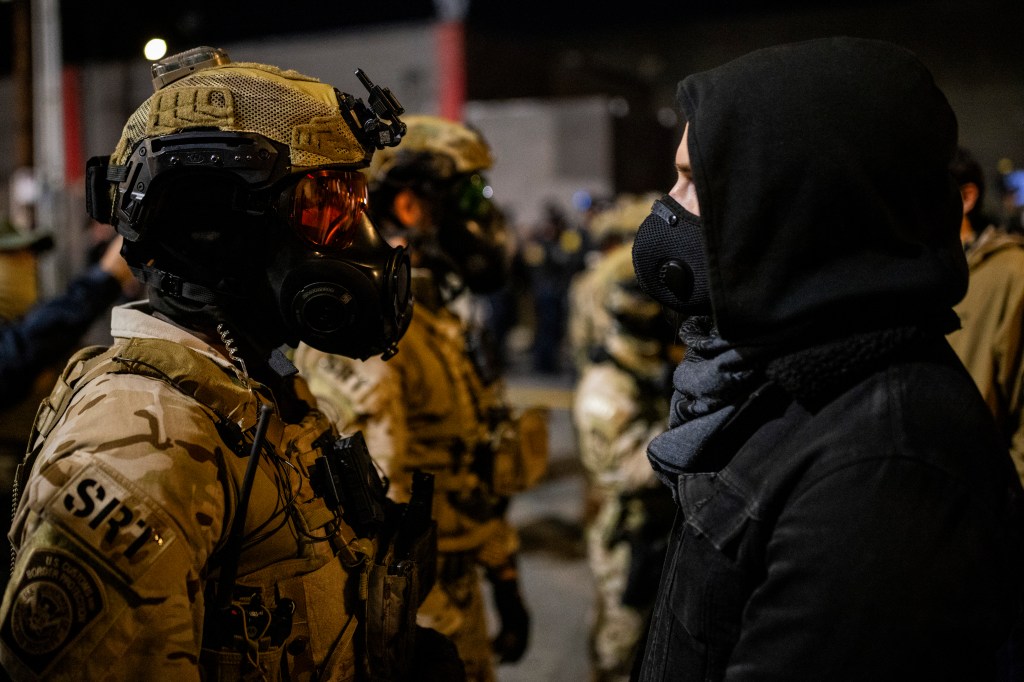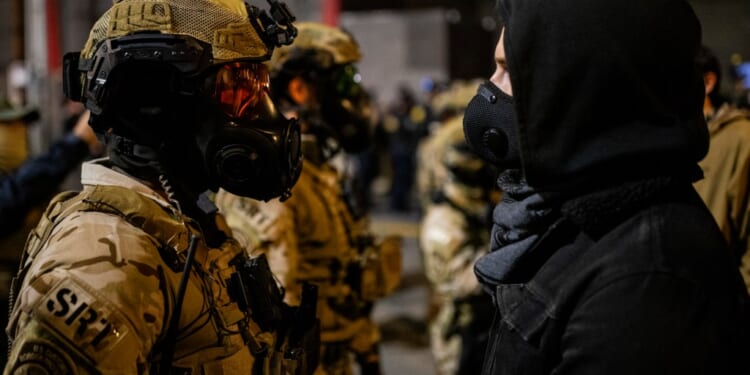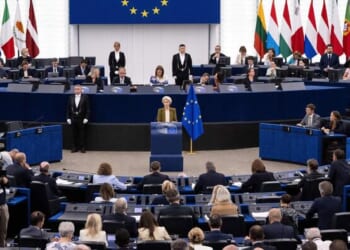
What legal authority does the administration actually have to send troops into cities over local objections? And where is this all heading?
Though news coverage often bundles them all together, the deployment of the Guard revolves around three distinct legal authorities in question: two separate sections of the U.S. Code, often referred to as “12406 authority” and “502 authority,” and the as-yet-uninvoked Insurrection Act of 1807.
In Chicago and Memphis, troops have been deployed under section 502(f) of Title 32 of the U.S. Code, which allows for Guardsmen to be used in “support of operations or missions undertaken by the member’s unit at the request of the President or Secretary of Defense.”
Mark Nevitt, a professor at Emory University’s School of Law and an expert in national security law, told TMD that 502 was “designed in the aftermath of Hurricane Katrina to make it easy for National Guards to respond to national disasters,” not for presidents to send in the Guard over the objection of governors.
This hasn’t been a problem in Memphis, where Tennessee Gov. Bill Lee welcomed the deployment, and the city’s mayor, Paul Young, grudgingly accepted it. But in Illinois, political leaders have taken a different tack. Gov. J.B. Pritzker referred to federal deployment as “Trump’s invasion,” and filed suit in federal court to block it. Chicago Mayor Brandon Johnson has vocally condemned federal operations in the city, barring federal troops from city property in the absence of a warrant.
U.S. District Judge April Perry took that opposition into account when considering a lawsuit filed by the Illinois state government, temporarily blocking the deployment of the Guard and ordering the soldiers returned to state control. However, the Court of Appeals for the 7th Circuit later allowed the Guard to remain under federal command, while maintaining the hold on Guard presence in Chicago. The White House also federalized Texas National Guardsmen, with the enthusiastic approval of Gov. Greg Abbott, to reinforce its presence in the Chicago area. Troops remain in Illinois, although the courts have prevented them from deploying to support federal objectives.
The Trump administration has invoked a different legal justification in Portland: Section 12406 of Title 10 of the U.S. Code. This authorizes a U.S. president to place the Guard under his or her direct command, rather than under state authority, in the event of a “rebellion or danger of a rebellion against the authority of the Government of the United States,” or if “the President is unable with the regular forces to execute the laws” in a given location.
For U.S. District Judge Karen Immergut, it’s doubtful that the federal government will be able to pass that statutory test. “As of September 27, 2025 [the date Trump ordered the Oregon Guard to be federalized], it had been months since there was any sustained level of violent or disruptive protest activity in Portland,” she wrote in her decision granting Oregon officials a temporary restraining order against the Trump administration, halting the deployment. However, two judges for the 9th Circuit Court of Appeals last week appeared to question whether federal judges could weigh in on the appropriateness of a president’s determination, as the administration appeals the case to the higher court. On Wednesday, Immergut extended the temporary restraining order another two weeks, in advance of a non-jury trial set to begin on October 29.
Immergut dismissed arguments from the administration that the threat of protests in other states, or incidents like protesters shining flashlights in the eyes of federal officers, meant that 12406 authority could be invoked, concluding that the “President’s determination was simply untethered to the facts.”
“I think it’s an opinion that reasonable people could disagree about,” Nevitt told TMD, noting that judges who weighed in on decision-making in situations like these risked inserting themselves into the political process.
After the White House attempted to activate and deploy California’s National Guard to Portland, Immergut, a Trump appointee, blocked the administration again, telling lawyers from the Justice Department that the move was in “direct contravention” of her previous order.
But even in the event of a defeat at the Supreme Court, the White House has a third card to play: the Insurrection Act. “I could use it, if I wanted to,” Trump said on Monday. “I’m allowed to use the Insurrection Act.”
The president isn’t wrong. The act, which gives the executive far broader authority to use the military for civil enforcement functions than any other statute, has been invoked 22 times by 10 U.S. presidents. “Whenever the President considers that unlawful obstructions, combinations, or assemblages, or rebellion … make it impracticable to enforce the laws of the United States … he may call into Federal service such of the militia of any State, and use such of the armed forces, as he considers necessary,” Section 252 of the act says.
But the Insurrection Act is usually invoked with the consent of the state governments in question. The last time it was invoked was in 1992, when Los Angeles erupted into riots after the acquittal of four police officers accused of using excessive force in the arrest and beating of Rodney King. At that point, local law enforcement had failed to restore civil order to large swaths of the city, multiple people had been killed, and then-Gov. Pete Wilson requested that President George H.W. Bush invoke the Insurrection Act.
The most famous and controversial invocations came during the civil rights era, when presidents Dwight Eisenhower, John F. Kennedy, and Lyndon B. Johnson called out military forces over the objections of state governors who were either openly defying court rulings or—in the case of Alabama Gov. George Wallace—refusing to protect threatened civil rights marchers.
But each of the three presidents “were very specifically alleging that governors were preventing the exercise of Americans’ constitutional rights,” rather than pursuing a general policy objective like the White House currently is doing, Kori Schake, the director of foreign and defense policy studies at the American Enterprise Institute and author of a recent book on U.S. civil-military relations, told TMD.
Trump administration officials claim they want to work with local officials. “Donald Trump wants to come in and help Chicago,” Attorney General Pam Bondi told Fox News host Sean Hannity on Wednesday. “We have Mayor Paul Young working with us, he’s amazing, he’s a Democrat.”
But Bondi also noted that while the administration didn’t believe that it had to use the Insurrection Act in Los Angeles, Washington, or Memphis, the president “absolutely” still has the authority to do so going forward.
Nevitt agreed. “Actually, the threshold for Insurrection Act invocation is a lower threshold, statutorily, than 12406,” he said, and Trump would have broad authority to not only activate federal forces, but use them to actively enforce the laws. The only significant restraints, under current law, are “political,” he argued.
Dispatch Senior Editor Sarah Isgur agreed. “For years, lawyers have been saying this is far too broad,” she told ABC News’ George Stephanopoulos on Sunday. “They warned about it at the beginning of the Biden administration, ‘this is the time to change the Insurrection Act,’ we missed the opportunity then, and here we are.”
Now, with a president who’s eager to use the military for law enforcement, the U.S.’s unique historical relationship to its military might be at risk, Schake told TMD. The armed forces themselves have rarely been deployed in a domestic law enforcement function—and when they have, almost always in close coordination with local governments and the other branches of the federal government, making U.S. citizens less likely to see soldiers as political opponents.
Reversing that trend could make the military itself more politicized. “If the American public starts to think of its military as domestic law enforcement, that’s going to change who chooses to go in the military,” Schake argued. “We’re really lucky that Americans don’t have to be afraid of our military. If they start to get afraid of our military, it really changes the relationship.”

















